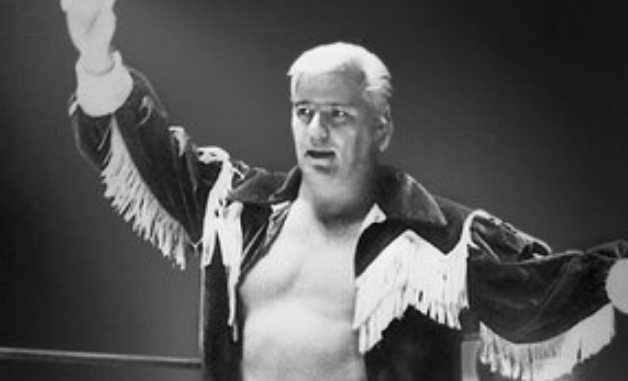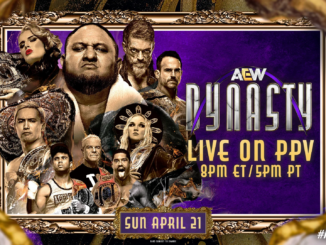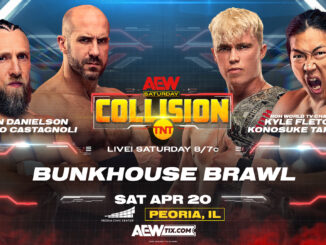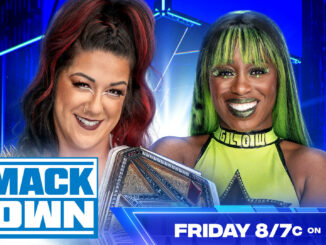
SPOTLIGHTED PODCAST ALERT (YOUR ARTICLE BEGINS A FEW INCHES DOWN)...
Pat Patterson, a top star throughout the 1960s and 1970s in various territories and one of the most influential assistants to Vince McMahon’s booking over the years, died today at age 79 from cancer.
Patterson, who was gay, was accepted by his colleagues during a time when that wasn’t the case for everyone, in part because he was so respected by his colleagues for his in-ring work and well liked in general. He went public as being gay on the WWE Network show “Legends House” in June 2014, although he was “out” and open about his sexual orientation to an increasing degree over the decades, including bringing his life partner Louie Dondero to personal engagements and wrestling events for many years. He and Dondero were together for 40 years; Dondero died of a heart attack in 1998.
He titled his 2016 autobiography “Accepted” as an acknowledgment of how he was accepted for who he was.
“It is surprising that in the world of wrestling, where you might expect all those macho guys to be homophobic, that it was never an issue – at least not in my case,” he wrote. “A friend of mind recently told me that if Michael Jordan had been gay, it would not have mattered because he was so good and drew so many people to his sport, that no one would have said anything bad about him. The same thing applied to me, according to my friend – I was special and that’s why I was accepted.”
He said he was never openly gay in front of the wrestlers and didn’t talk about it in the dressing room. “Unless you were close to me,” he wrote, “you never really knew.” He said he was young and liked to have fun and party like any other guy, but he felt he had to be more discrete. “I couldn’t draw attention by flirting with men at the hotel bar or bringing guys back to my room. I couldn’t tell the other wrestlers stories about my conquests the way that most other guys were bragging about how many girls they slept with that week.” He said some wrestlers used him as an alibi with their wives because their wives felt their husbands were safe if they were hanging out with Pat and not cavorting around town.
Patterson won the AWA Tag Team Titles with Ray Stevens, and both were known as ahead-of-their-time workers in terms of athleticism and ring psychology and ultimately one of the great tag teams of all-time. He was based out of San Fransisco most of his career in Roy Shire’s territory and later the AWA. He joined WWE in 1979 where he became the first Intercontinental Champion after winning a fictional tournament in Brazil.
Patterson worked closely with Vince McMahon and is credited as being one of the best “wrestling minds” when it came to match psychology and overall booking schemes.
“Pat’s stellar in-ring career came to an end in 1984, but an equally impressive career began when he joined WWE as an executive,” Vince McMahon wrote in the forward in Patterson’s 2016 autobiography. If not for the magnificent creative mind of Pat Patterson, I can honestly say WWE would not be anywhere near where it is today. Pat will always have my undying respect and admiration.”
He worked very closely with “The Rock” Dwayne Johnson during his peak years in WWE. Patterson also came up with the concept for the Royal Rumble match. He also was a color commentator alongside Vince McMahon in the mid-1980s as his in-ring career was winding down.
He had appeared less and less often at WWE events in the last decade, but still tried to make it to major PPV events, both because he was able to contribute behind the scenes, but also because it was a chance to stay in touch with wrestlers and others in WWE.
Patterson resigned from WWE briefly in 1992 after he was accused of sexual harassment by an announcer who had a short stint in WWE, Murray Hodgeson. It was one of many serious of sexual allegations against WWE personnel in the early 1990s that made newspaper headlines and was the subject of national talk shows. He returned to an executive role with WWE shortly thereafter.
Besides wrestling and working behind the scenes, Patterson had an on-air role with Gerald Brisco in a comedy act that were portrayed to be “stooges” for Vince McMahon.
Patterson grew up in Montreal and detailed his difficult journey to fame and fortune in his autobiography. “The one luxury we had was a radio set, and it was very important to the whole family,” he wrote. He detailed his love of music and figure skating.
He said his life course was determined when a free ticket to a local wrestling show was included in a loaf of bread his mother bought on a week they couldn’t afford any meat. “I wasn’t sure what the show was – we didn’t have a television set the time – but it was free, so I was going no matter what. We could not afford to see any shows then. I went crazy after seeing my first match, and I have yet to fully recover. I remember watching Buddy Rogers in the ring. It was like God was walking down the aisle. He had a presence about him; I didn’t know what he was made of. It was incredible, and I’ve never seen anything like it since. … I knew after that first wrestling match that I had found my calling.”
The wrestling industry is paying tribute to Patterson on Twitter today.
Pat Patterson was more than the first Intercontinental Champion & father of the Royal Rumble Match. He helped lay the foundation for WWE as we know it. His mentorship shaped careers, his creativity sparked innovation and his friendship lifted spirits. Love you, Pat. We miss you. pic.twitter.com/TugpAOrN6O
— Vince McMahon (@VinceMcMahon) December 2, 2020
No words can describe what he gave to us. His body as an in-ring performer, his mind as a storyteller, and his spirit as a beloved member of our large @WWE family. I will miss him for so many reasons… it’s never goodbye, it’s see ya down the road. Love you, Pat. Abooze
— Triple H (@TripleH) December 2, 2020
I can not express how crushed I feel right now with the loss of Pat Patterson. A true member of my family, mentor and dear friend.
I love you Pat.
God speed. pic.twitter.com/FdaAFnsw8m— Shane McMahon (@shanemcmahon) December 2, 2020
Loss is incredibly difficult. Those we love are only truly gone if we stop caring. Pat Patterson lived life as it should be lived with passion, love and purpose. He helped so many and always entertained with a story or joke. He will live on in my life always. Love you Patrick.
— John Cena (@JohnCena) December 2, 2020
I just heard the terrible news about the passing of Pat Patterson. I loved the man. I could listen to his stories for hours. One of the all-time great wrestlers, one of the best minds in the business, and a dear friend.#RIPPatPatterson https://t.co/SozhlF8bQY
— Mick Foley (@RealMickFoley) December 2, 2020




Leave a Reply
You must be logged in to post a comment.